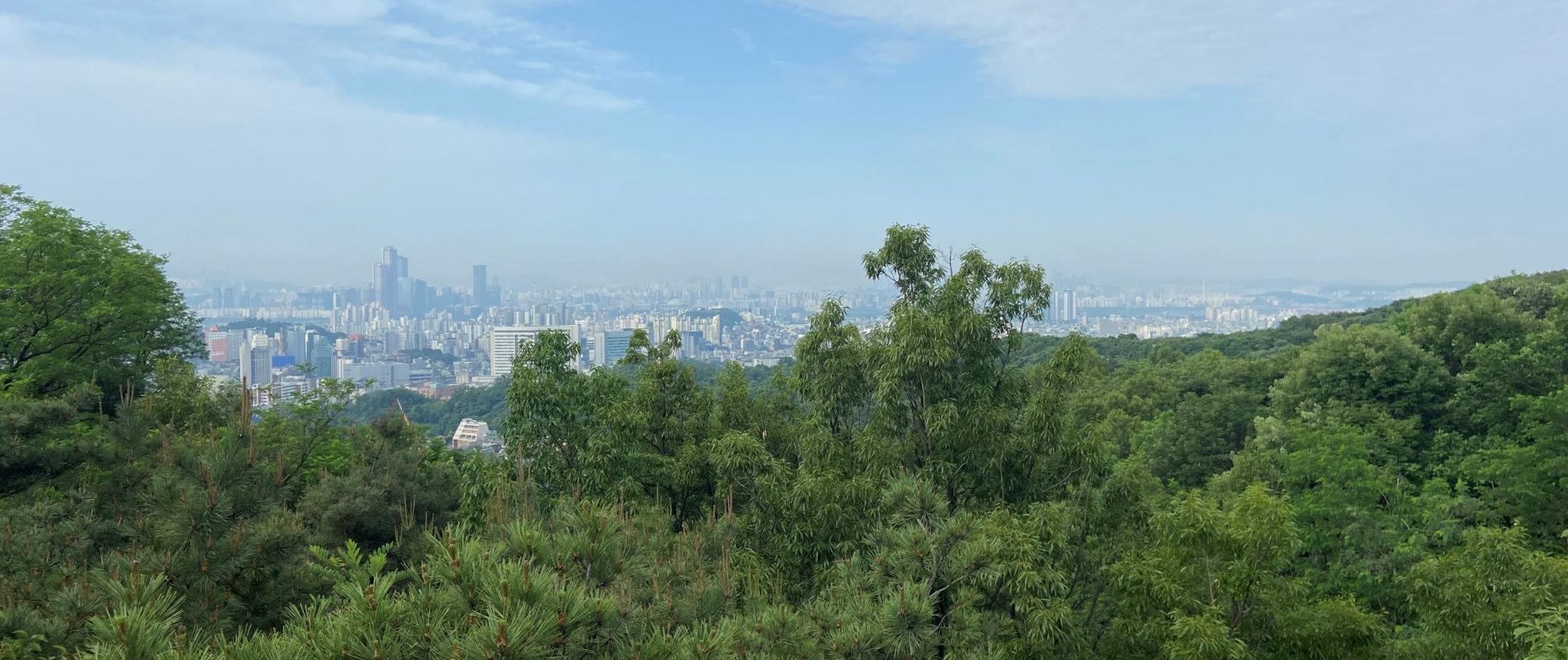In South Korea, people speak Korean and write using the hangeul alphabet. The thought of not knowing the language of the country can be scary, and might even deter you from going altogether.
If I don’t speak Korean, how will I find a job? How will I make friends? These are all valid questions.
Personally, I went on a working holiday in South Korea without speaking Korean. I tried to start learning a bit before I went but to be honest, I barely retained anything beyond “hello,” “thank you,” and “goodbye.”
I won’t lie: yes, it’s hard to live and integrate into Korean society without speaking the language, but it’s not impossible.
Is English enough?
If you already speak English, that will be very helpful.
In Seoul, you’ll be able to get by with English. A lot of information is written in English: at subway station names, on menus in certain cafés, bars, and restaurants. Many Koreans also speak English to a level that allows for some basic communication.
In other parts of the country, it’s a bit different because once you leave tourist-heavy areas, you’ll find little or no English at all. That’s when knowledge of hangeul (I explain this later) or access to the internet will come in really handy.
The magic of translation apps
Nowadays, there are tons of translation apps (text and audio) that can help you out when you don’t understand. One of the most popular in Korea is Papago, which lets you take pictures of text and get a translated version back. It’s generally very reliable.
Papago saves my life daily, whether I’m grocery shopping, reading important signs, translating websites, etc.
Don’t feel awkward about pulling out your phone at the checkout to ask a question or snapping pics of product labels in supermarkets; it can help you avoid silly mistakes.
Koreans themselves may even use their translation apps to communicate with you. Sure, it’s not the most personal or natural way to have a conversation, but at least it opens the door to the possibility of connection.
Learn the hangeul alphabet
Hangeul is what Koreans call their alphabet. Even though I went to Korea without knowing more than a few basic phrases, I did at least learn hangeul a few weeks before heading there. And that’s the first piece of advice I’d give to anyone planning to go to Korea without speaking the language: learn the alphabet!
At first glance it might look intimidating, but honestly, you won’t need more than a few days to memorize it. A few weeks of practice will then get you comfortable with sounding out nearly all text that you come across.
You might wonder: what’s the point of learning the alphabet if I don’t understand what I’m reading? Well, it’s actually useful for a lot of things:
1. You’ll recognize the names of subway stations, bus stops, neighbourhoods, etc.
2. Many Korean words are borrowed from English. They’re just phonetically rendered in hangeul, for example:
- coffee – 커피 – ko-pi
- cappuccino – 카푸치노 – ka-pu-chi-no
- banana – 바나나 – ba-na-na
3. It also makes it possible to recognize important words you see every day, such as:
- 분 boon means minute, often seen in public transportation.
- 원 is won, the local currency.
- 여자 yeoja and 남자 namja mean woman and man respectively. You might see them on café receipts where you need a code to access the washrooms. If you remember those words, you’ll know which code to use.
Hangeul also helps when entering addresses in navigation apps. Apps recognize places better in hangeul than in the Latin alphabet.
Even without fully committing to Korean grammar and vocab yet, just knowing how to read hangeul helps me identify and memorize new words I see regularly.
So if you have some time, learn the alphabet. There are many free online resources.
Connecting with locals
Where the language barrier is most frustrating is when you want to make connections with locals. It’s not hard to meet people, but it’s hard to build deeper, lasting relationships. Small talk is possible with a bit of Konglish and a translator app, but deeper conversations hit a wall. Plus, Koreans can be shy, especially if they’re not confident in English.
It can be frustrating to be limited to repetitive surface-level exchanges when you want to learn more about the country and culture.
If you have a strong desire to meet and connect with locals, that may give you the motivation to really try to learn the language. And of course, you have much more exposure when you’re living in the country.
How to learn Korean
1. Take free classes
In Seoul and other cities, various organizations offer free Korean classes. Check if there are any in your area or city.
In Seoul, the Global Seoul Center is the main provider of free classes, available multiple times a year at different levels.
These classes are in high demand among foreigners so you need to act fast when registration opens.
2. Register at a university or language school
You can also take paid classes at a university for one or more semesters, or at a private language school.
At universities, courses can be intense and require real commitment. Absences are frowned upon and can prevent you from completing your level.
In Seoul, university courses and language schools are generally more expensive than in other cities.
3. Self-study
If you don’t have time or budget for in person classes, you can definitely study on your own. It’s harder, but you can still pick up enough vocabulary to facilitate day-to-day interactions.
There are lots of apps for learning Korean, as well as self-study textbooks. It’s a good idea to buy them in your home country before arriving in Korea so that they’re adapted to your needs.
Overcoming the language barrier
If you are really motivated to and passionate about experiencing Korea, don’t let your lack of language skills delay or dissuade you from making the move.
Not speaking Korean won’t stop you from having an amazing experience. You’ll just need a bit more patience. It might take longer to read menus and order in restaurants. You might take longer to figure out directions or use buses. You’ll make mistakes: ordering the wrong drink, buying the wrong item, or getting off at the wrong stop. But you’ll survive!
Approach people even if you only know a few words of Korean; don’t be afraid to make mistakes. As the weeks and months go by, you’ll feel more and more comfortable in your new setting.
And remember that Koreans are generally very patient and understanding people.












 Français
Français English
English




0 comments
{{like.username}}
Loading...
Load more